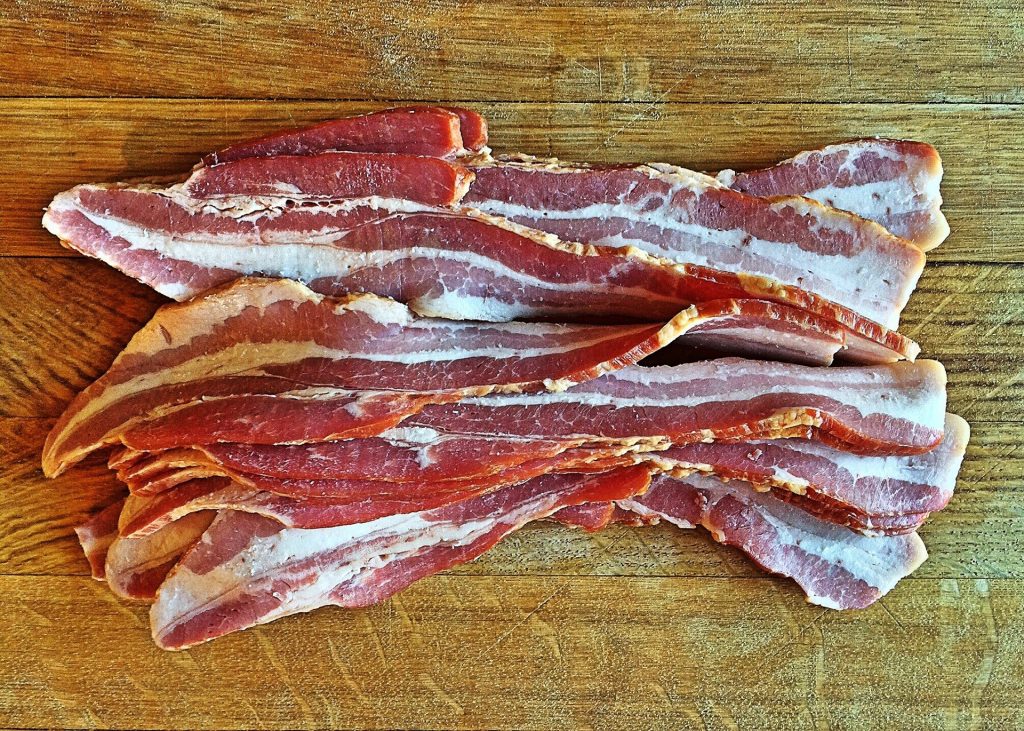Bacon: the killer on your plate
3 min read
Wokandapix | Pixabay
Student advocates for warning labels at the UC
By SHARJEEL AHMED
Staff Writer
Every morning, UMW students stand in line at the UC to fill their plates with eggs, biscuits, sausages and bacon. And while these are just a few of the staple breakfast foods, one consistent and popular choice among many are pork products. I never thought much about it, until my trip to Washington, DC, a few weeks ago.
In DC, I witnessed a demonstration in which physicians had united against McDonald’s in the consumption of pork. McDonald’s typically adds bacon to an order for $1.50 extra, but during their promotion “Bacon Hour,” bacon was free as a side with any purchase. Citing health concerns that arise from ingesting those products, doctors held signs that read “I’m Riskin’ It,” and “Bacon Causes Butt Cancer,” warning consumers of the carcinogenic effects of bacon, a pork product.
The protestors were not mistaken in their assertions. Pork consumption has become a major concern across the US, and has been deemed dangerous by the World Health Organization (WHO). After reviewing 800 studies, they have determined that 50 grams of processed pork eaten daily exacerbates cancer rates by 18 percent.
Due to the high amount of pork made available to students, the UC should be required to provide signage indicating the dangers of consuming pork products. Many students consume pork products in bulk and without hesitation. While I am a proponent of people eating how they please, offering pork in the dining hall is comparable to feeding students poison.
Pork is becoming so infamous in the high risk foods category that some schools have removed pork from their dining halls, like Paul Quinn College in Dallas, TX in 2012. Aside from the obvious health benefits, many students reported that they no longer had concerns of what they could or could not eat in the cafeteria. The decision was controversial to say the least, but made for a more inclusive environment. For instance, a major component of the Jewish and Muslim faiths is to abstain from consuming pork and all pork products.
Muhammad Khan, a senior business major and ambassador at the UC Dining Hall, said, “the dining hall will receive more business from me and others if we know they don’t have pork and my food is completely free of it.”
In addition to the moral and ethical pleas to change the status quo, universities have a duty to preserve the general health of the student body. When a university is providing adequate housing, a clean environment, and quality education to help students grow, it seems counterintuitive to be poisoning them with food options that are categorically unhealthy and could possibly lead to long term adverse health effects.
Processed meats include ham, sausage, hot dogs, bologna, salami, pepperoni, and pastrami, names that are very familiar to us. Controlled portions of these foods are most likely non life-threatening, but because of the increased risk of colorectal cancer, no amounts of processed meats are considered “safe to eat,” according to the American Institute for Cancer.
It may be a stretch to remove all pork products from the UC, but to simply provide nutritional facts about the dangers of pork may be a step in the right direction. In restaurants, meats and seafood that are not entirely cooked come along with warning notices of foodborne illnesses. In the same way, bacon, which makes its way into salads and sandwiches, should be complemented with a similar sign. For example, four pieces of bacon accounts for half the recommended sodium intake for a day.
The UC already provides a calorie count for a majority of meals, but these nutritional facts should be more readily available while students are deciding what they’ll eat. That being said, you can still order your eggs sunny-side up, but next time, hold off on the bacon.











